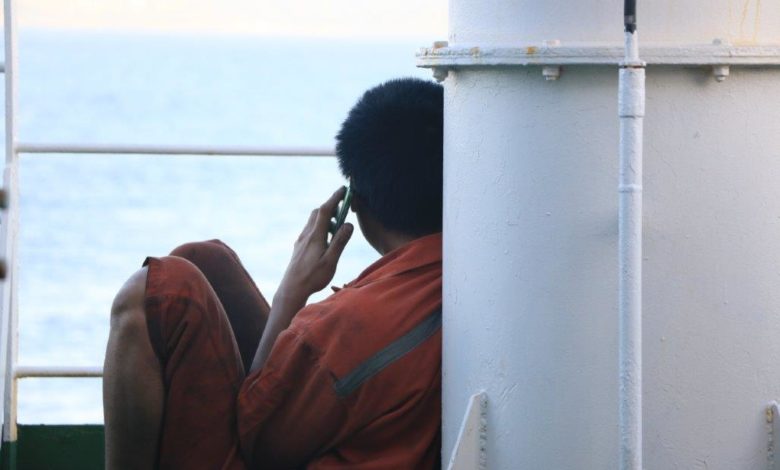
Can improved connectivity onboard lead to more seafarers extending their time onboard before pursuing a career ashore? The second installment of Connectivity with Inmarsat, a special report contained within Ship Concept 2035, our new magazine.
Shipping faces a shortage of qualified staff at sea, a problem that risks becoming more acute over the next 10 years.
One way to help fix the problem is to ensure people stay longer in their jobs at sea with many experts saying for this to happen connectivity must improve. The availability of internet access is now a critical factor in seafarers’ career decisions, something that will only become more important in the years ahead.
“Improved connectivity is an essential expectation for people coming out to sea,” says Pradeep Chawla, the CEO of training specialist MarinePALS. “You cannot explain to an 18-year-old who is used to connectivity of one gbps to accept a VSAT connection of two or four mbps.”
Improved connectivity is an essential expectation for people coming out to sea
“New entrants may not even join the industry if the comms plans are not conducive,” warns Peter Schellenberger, who runs Novamaxis, a consultancy.
By 2028, Schellenberger predicts that 90% of quality vessels will have a Leo type comms plan.
“By staying connected with family and accessing digital resources, seafarers can enjoy a better quality of life, which can positively impact their wellbeing and job satisfaction. This, in turn, may lead to longer tenures at sea,” says Stamatis Tsantanis, chairman and CEO of Greek owner Seanergy Maritime.
Improved internet access can significantly reduce feelings of loneliness and isolation amongst seafarers. The ability to stay connected with family and friends via video calls, messaging, and social media can help seafarers remain a part of family milestones and important life events in real-time, and maintain a connection with the outside world, which can reduce the emotional distance between shore and sea, alleviate feeling of being alone during long ocean voyages, boost morale, and create a more positive and motivated work environment.
By enhancing work efficiency and providing access to a wealth of online options in their free time, a more rewarding work-life balance can be achieved. From communicating with family and friends, managing personal matters, and following the latest news to watching sports, movies, and listening to music, a reliable internet connection opens up a world of opportunities to seafarers, allowing them to relax and enjoy their free time as they wish, which is essential for their overall wellbeing.
“The work-life balance can make a career at sea more sustainable,” says Niraj Nanda, chief commercial officer of shipmanagement giant Anglo-Eastern.
“Connectivity helps facilitate meaningful social interaction with friends and family ashore and supports recreational engagement like browsing and streaming—both of which ease the psychological burden of long voyages,” says Ajay Chaudhry, CEO of shipmanagement at Synergy Marine Group.
“By prioritising safety, improved connectivity onboard can positively impact seafarers to extend their careers at sea,” Nanda says.
“Better connectivity can help improve operational efficiency and the well-being of seafarers onboard, thereby contributing to a more fulfilling and secure work environment,” he says.
“Improved connectivity allows seafarers to access news, digital banking and services, entertainment, and educational resources. Staying informed and entertained can make their time onboard more fulfilling,” says Shah Irani, chief technology officer at Fleet Management.
Moreover, as Nanda points out access to online medical and mental healthcare services, therapy, and video consultations by trained professionals can help reduce the distance between specialists and the seafarers who may require their services. This can positively impact the physical and psychological wellbeing of seafarers by improving medical care onboard, thus reducing the need for port visits, medical sign-offs and diversions, and the relevant costs.
We have to stop waving connectivity as a magic wand
With access to online courses and studies, seafarers can further their knowledge, training, and qualifications during their free time onboard. This enables seafarers to enhance their skills and advance in their careers in the industry, which can be a strong motivator for extending their time at sea.
Manish Singh, a former seafarer and ship manager who now runs advisory Aboutships, cautions readers that connectivity by itself is not a panacea to the seafarer shortage issue.
“We have to stop waving connectivity as a magic wand,” he says, predicting that even “laggard” fleets will have fast, reliable and cheap internet soon.
“Longer term crew retention has more to do with a sense of inclusion, purpose and through-career visibility,” Singh argues.
Better connectivity helps with wellbeing and continuity, he concedes, but retention also needs recognition, upskilling, and agency for colleagues onboard.
“I envisage seafarers will feel more connected into the overall workflow as we embrace a connected and data-driven ecosystem,” Singh concludes.
To access the whole of Ship Concept 2035 for free online, click here.




